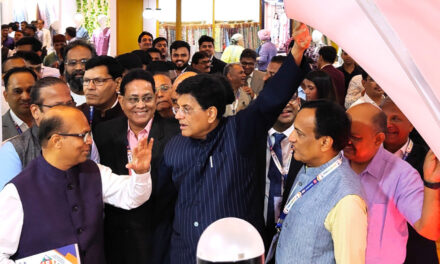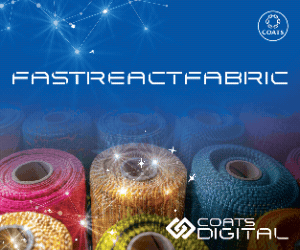 Global wool industry leader The Woolmark Company joins forces with India’s premier fashion platform Lakmé Fashion Week in partnership with FDCI to launch ‘IMPACT HUB’ by RISE Worldwide, a new-age space to showcase innovation in sustainable and circular fashion. An exclusive space inspired by art galleries, IMPACT HUB will illustrate problems faced by the fashion industry while also revealing innovative solutions through aesthetically appealing and interactive presentations.
Global wool industry leader The Woolmark Company joins forces with India’s premier fashion platform Lakmé Fashion Week in partnership with FDCI to launch ‘IMPACT HUB’ by RISE Worldwide, a new-age space to showcase innovation in sustainable and circular fashion. An exclusive space inspired by art galleries, IMPACT HUB will illustrate problems faced by the fashion industry while also revealing innovative solutions through aesthetically appealing and interactive presentations.
The Woolmark Company’s partnership with Lakmé Fashion Week, FDCI and RISE Worldwide marks a noteworthy milestone for the growing demand for circularity, transparency, and ethical practices within India’s fashion community. The Woolmark Company represents authenticity and commitment between woolgrowers, brands and consumers by innovating within supply chain of Australian Merino wool, which is 100% natural, renewable and biodegradable. The Impact Hub will showcase Merino Wool’s innate circularity property, and innovations in fashion and textile.
This season, brainchild of the ground-breaking partnership, IMPACT HUB is set to revolutionise the fashion industry across textile innovation, recycling, business innovation, packaging and crafts and with a unique walkthrough of five enterprises rooted strongly within the ideals of sustainability. These innovators are:
• Craste: Craste is a one stop solution for packaging solutions that works towards crop waste management by providing additional revenue to farmers. They convert this waste to make materials for packaging and furniture applications. The enterprise is committed to using nature’s resources judiciously, creating alternatives to timber-based paper.
• Humanity Centred Design: Recognized by UNEP, United Nations and other global change-makers, Humanity Centred Design has created a range of new-age recyclable materials termed HCD-Tex™ (Humanity Centred Design Textile). They have also designed and developed an innovative circular recycling framework that helps over 150 apparel manufacturing MSEs towards sustainable transformation and supports in recycling textile waste.
• Relove: Having collaborated with over 100 brands, Relove follows a business model that works on resale technology enabling brands to go circular. Relove manages the entire peer to peer resale process end to end including – technology integration, listing approvals, shipping, communication, customer care and traceability.
• 200 Million Artisans: 200 Million Artisans is an ecosystem enabler catalysing self-reliance and responsible innovation in India’s artisan economy by providing access to knowledge, resources, and networks that empower artisan-producers and impact entrepreneurs. The Business of Handmade Report is their research focused on the informal, artisan economy as seen and experienced by 12 craft-based enterprises.
• Fleather: The brainchild of the founders of Phool.co, Fleather is the next gen sustainable and animal friendly alternative to leather. Fleather is a chance discovery, made from the enormous amount of flower waste from temples and mosques, being dumped into River Ganga. An innovation that is felicitated by PETA India and adopted by the PVH Corporation to create a range of vegan leather bags.
Commenting on the collaboration, Jaspreet Chandok, Head – RISE Fashion and Lifestyle said “In our continued efforts to encourage sustainability, we look forward to longevity in our partnership with The Woolmark Company and their commitment to bring authenticity to the sustainable fashion industry. This season, the IMPACT HUB introduces five enterprises that are synonymous with sustainability. We wish them good luck and look forward to making this partnership with The Woolmark Company grow in the seasons to come.”
Commenting on the collaboration, John Roberts, MD – The Woolmark Company said “As the global authority on wool and the world’s most-trusted fibre brand, we remain committed to offering solutions to bring about positive change through innovations. The Impact Hub partnership with Lakme Fashion Week helps the industry transition to circular principles, by creating a platform for innovators and the supply chain to showcase their work.”

















